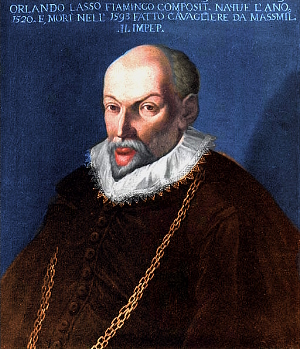In Celebration of the Human Voice - The Essential Musical Instrument
Home | Doo Wop | Barbershop | World | Contemporary | Christian | Vocal Jazz | Choral | Christmas | Instructional | Arrangements
Classical | Opera | Musicals | Personality | Young Singers | Disney | Videos | Songs | The Artists

Orlando Lassus Biography

Click Here for Sheet Music and Songbook Vocal Arrangements
Orlando di Lasso was born in Mons in the province of Hainaut, in what is today Belgium. Information about his early years is scanty, although some uncorroborated stories have survived, the most famous of which is that he was kidnapped three times because of the singular beauty of his singing voice. At the age of 12 he left the Low Countries with Ferrante Gonzaga and went to Mantua, Sicily, and later Milan (from 1547 to 1549). While in Milan he made the acquaintance of the madrigalist Hoste da Reggio, an influence which was formative on his early musical style. He then worked as a singer and a composer for Constantino Castrioto in Naples in the early 1550s, and his first works are presumed to date from this time. Next he moved to Rome, where he worked for the Archduke of Florence, who maintained a household there; and in 1553, he became maestro di cappella (chorus leader) of the Basilica di San Giovanni in Laterano in Rome, a spectacularly prestigious post for a man only 21 years old, but he stayed there only for a year (Palestrina took this post a year later, in 1555). No solid evidence survives for his whereabouts in 1554, but there are contemporary claims that he traveled in France and England. In 1555 he returned to the Low Countries and had his early works published in Antwerp (1555-1556). In 1556 he joined the court of duke Albrecht V of Bavaria, who was consciously attempting to create a musical establishment on par with the major centers in Italy; Orlando di Lasso was one of several Netherlanders to work there, but by far the most famous. He evidently was happy in Munich and decided to settle there. In 1558 he married Regina Wackinger, the daughter of a maid of honor of the Duchess; they were to have two sons, both of whom became composers. By 1563 Orlando di Lasso had been appointed maestro di cappella, succeeding Ludwig Daser in the post. Orlando di Lasso was to remain in the service of Albrecht V and his heir, Wilhelm V, for the rest of his life. By the 1560's Orlando di Lasso had become quite famous, and composers began to go to Munich to study with him. Andrea Gabrieli went there in 1562, and possibly remained in the chapel for a year; Giovanni Gabrieli also possibly studied with him in the 1570s. His renown had spread outside of strictly musical circles, for in 1570 Emperor Maximilian II conferred nobility upon him, a rare circumstance for a composer; Pope Gregory XIII knighted him; and in 1571, and again in 1573, the king of France, Charles IX, invited him to visit. Some of these kings and aristocrats attempted to woo him away from Munich with more attractive offers, but Orlando di Lasso was evidently more interested in the stability of his position, and the splendid performance opportunities of Albrecht's court, than in financial gain. "I do not want to leave my house, my garden, and the other good things in Munich," he wrote to the Duke of Saxony in 1580, upon receiving an offer for a position in Dresden. In the late 1570's and 1580's Orlando di Lasso made several visits to Italy, where he encountered the most modern styles and trends. In Ferrara, the center of avant-garde activity, he doubtless heard the madrigals being composed for the d'Este court; however his own style remained conservative, indeed becoming more simple and more refined as he aged. In the 1590s his health began to decline, and he was treated for hypochondria; however he still was able to compose as well as travel occasionally. His final work was the exquisite set of 21 madrigale spirituale, the Lagrime di San Pietro (Tears of St. Peter), which he dedicated to Pope Clement VIII, and published posthumously in 1595. Orlando di Lasso died in Munich, on June 14, 1594, the same day that his employer decided to dismiss him for economic reasons; he never saw the letter. |
Select a Category |
Want to Sing? - Find a Chorus Near You
List of Choruses by State | List of Choruses by City
